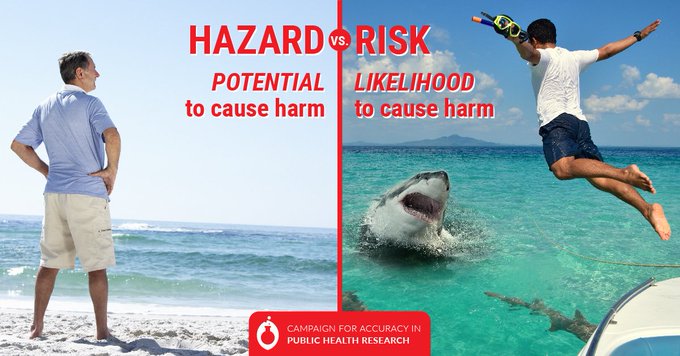Though abused by epidemiologists hoping to become expert witnesses in lawsuits against companies (an alarming number of participants at both IARC and NIEHS), absolute risk tells us as as little as averages, because '10% more risk' is silly if the relative risk is 1 in a million. Yet IARC, the UN body claiming to be the world leader in epidemiology, uses suspect methodologies and bizarre doses to claim things like drinking hot tea or eating meat increase your risk of cancer.
Yet red meat and cigars get nowhere near the unwarranted bad press of sharks. Shark attacks are in the news because there have been more this year, but in order to get an average, you just add up the highs and lows and divide by the time period. This has simply been a high year. If someone wants to claim that is due to global warming or cell phones, they can because epidemiology can correlate anything to anything, but that doesn't make it science. In reality, it is just a statistical blip, the same way some years have more bees dying than others.
But if managing risk is your thing, a new tool has all of the information on shark attacks. Now, risk is relative despite what epidemiologists sometimes sell. My risk of a shark attack is zero because I live two hours from the ocean. The data show if I want my relative risk to go down even when I am in Florida, I simply should not go on a Saturday in July. That is when the most attacks occur.

Source: FloridaPanhandle.com
How many 5G phones or GMO soybeans does it take to cause Saturdays in July to be so dangerous? Well, none, this is a science site and not a trial lawyer-run grift like Environmental Working Group. More people are on vacation in July, and a Saturday morning in July will mean more people at beaches. Absolute occurrences are higher because there are so many more people, but your relative risk actually drops.
About 10 people per year will die in shark attacks. That's less than will be killed by cows, but since I don't work with cattle my relative risk of that is also zero, even if the absolute risk can be stated by someone with an agendas as that cows are 150% more dangerous than sharks.
Don't even get me started in coconuts. As the Australian Institute of Marine Science notes, there is on average a 15X greater chance of those killing me in places where there are beaches, while lightning is 150X as likely to do me in. Coconuts are offing people all year round.
Yet that 10 people dying from sharks is still only an average, so you shouldn't increase your personal risk by jumping from the boat with a tomahawk ribeye in your mitts.




Comments